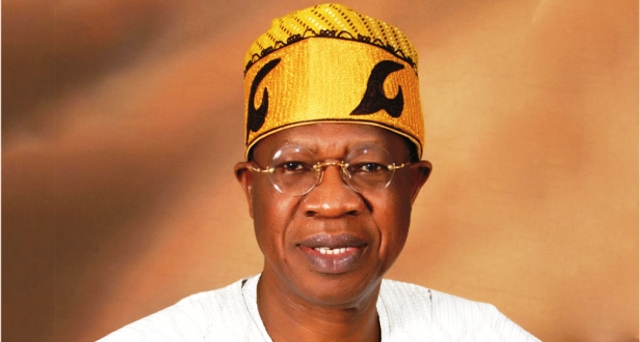Business
FG Recommits To 2017 Media Digitisation Target

The Federal Government
says it is putting every machinery in motion to ensure that all media outfits in the country go digital by next year.
The Minister of Information, Culture and Tourism, Alhaji Lai Mohammed, said this at a summit organised by the Advertising Practitioners Council of Nigeria (APCON) in Lagos.
The minister represented by Mr Peter Dama, the Director, Press and Public Relations, Federal Ministry of Information and Culture (FMIC), said that the pilot launch had been done in Jos.
The minister said that the National Broadcasting Commission (NBC) had commenced the test-running process and the Federal Government would give its support for its take-off in 2017 in Nigeria.
“This is based on the International Telecommunications Commission’s (ITC) directive that all analogue broadcasting should go digital.
“We have already done the pilot launch in Jos, Plateau, because of the existing facilities they have on ground to support the digitalisation process.
“We intend to roll out to other parts of the country to meet the 2017 deadline, ‘’ he said.
The minister urged other states to put in place facilities that would support the transformation process.
He said that digitalisation was a welcome idea because it would create more jobs and help engage the youths meaningfully in the county.
Also speaking, the Registrar of APCON, Alhaji Garba Kankarofi, said that the summit was organised following the transformation of the global advertising industry and the rapid technological changes.
“The summit will, in the light of the above developments in technology and other various dynamics in the global and local economies, showcase advancements in market communication practices and standards.
“It will also explore the relationship between current and future media platforms as well as examine new business models for today’s marketing communication industry,’’ he said.
Mr Nicholas Vervelde, Chairman, Beer Sectoral Group (BSG), represented by Dr Lanre Olugbogi, the group’s secretary, said that BSG was committed to promoting responsible service among operators and consumers.
“We are aware that while most consumers of beverage alcohol drink responsibly, there are some who drink without restraint, which can present health and safety challenges to themselves and others.
“Therefore, our efforts are geared toward a sound professional practice among members, promoting responsibility among operators and, particularly, consumers toward making sustainable contributions to the socio-economic development of Nigeria, ‘’he said.
Similarly, Mr Benjamin Pius, the Chief Executive Officer, BSP Media International (UK), said that experts in the industry projected that by 2018, advertising spread across Africa would rise to over $25 billion.
Pius said that the escalating growth in the industry would largely be driven by changes in consumer behaviour and technology, presenting its own set of opportunities and challenges.
“Advertisers, media owners, telecom operators and industry regulators do need to make informed decisions to help them address these challenges and take advantage of the new opportunities, ‘’he said.
The Tide reliably informed that the summit was supported by the Broadcasting Organisations of Nigeria (BON), Media Independent Practitioners Association of Nigeria (MIPAN), and Advertisers Association of Nigeria (ADVAN).
Business
Kenyan Runners Dominate Berlin Marathons
Kenya made it a clean sweep at the Berlin Marathon with Sabastian Sawe winning the men’s race and Rosemary Wanjiru triumphing in the women’s.
Sawe finished in two hours, two minutes and 16 seconds to make it three wins in his first three marathons.
The 30-year-old, who was victorious at this year’s London Marathon, set a sizzling pace as he left the field behind and ran much of the race surrounded only by his pacesetters.
Japan’s Akasaki Akira came second after a powerful latter half of the race, finishing almost four minutes behind Sawe, while Ethiopia’s Chimdessa Debele followed in third.
“I did my best and I am happy for this performance,” said Sawe.
“I am so happy for this year. I felt well but you cannot change the weather. Next year will be better.”
Sawe had Kelvin Kiptum’s 2023 world record of 2:00:35 in his sights when he reached halfway in 1:00:12, but faded towards the end.
In the women’s race, Wanjiru sped away from the lead pack after 25 kilometers before finishing in 2:21:05.
Ethiopia’s Dera Dida followed three seconds behind Wanjiru, with Azmera Gebru, also of Ethiopia, coming third in 2:21:29.
Wanjiru’s time was 12 minutes slower than compatriot Ruth Chepng’etich’s world record of 2:09:56, which she set in Chicago in 2024.
Business
NIS Ends Decentralised Passport Production After 62 Years
Business
FG To Roll Out Digital Public Infrastructure, Data Exchange, Next Year
-
Sports4 days ago
CAFCL : Rivers United Arrives DR Congo
-
Sports4 days ago
FIFA rankings: S’Eagles drop Position, remain sixth in Africa
-
Sports4 days ago
NPFL club name Iorfa new GM
-
Sports4 days ago
NNL abolishes playoffs for NPFL promotion
-
Sports4 days ago
NSF: Early preparations begin for 2026 National Sports Festival
-
Sports4 days ago
Kwara Hopeful To Host Confed Cup in Ilorin
-
Sports4 days ago
RSG Award Renovation Work At Yakubu Gowon Stadium
-

 Politics4 days ago
Politics4 days agoRivers Assembly Resumes Sitting After Six-Month Suspension

